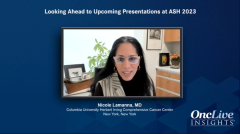
Future of Treatment of B-Cell Malignancies
Nicole Lamanna, MD, looks ahead at the future of treatment of B-cell malignancies, highlighting exciting therapeutic developments.
Episodes in this series

This is a video synopsis/summary of an Insights featuring: Nicole Lamanna, MD.
Dr. Lamanna highlights several areas of interest regarding chronic lymphocytic leukemia (CLL) treatment she is looking forward to at the 2023 American Society of Hematology (ASH) annual meeting.
Longer-term follow up on pivotal Bruton tyrosine kinase (BTK) inhibitor trials will provide valuable insights on durability of responses. There is also growing data on BTK plus B-cell lymphoma 2 (BCL2) inhibitor combinations regarding efficacy for fixed treatment durations tailored by minimal residual disease (MRD) monitoring. Using MRD for guidance could optimize therapy delivery, and multiple abstracts will explore this concept.
Novel therapies for poor prognosis CLL subpopulations like Richter’s syndrome also warrant focus. Additionally, mitigating long-term toxicities is paramount, so presentations discussing adverse event prevention strategies with BTK inhibitors, venetoclax, and other novel agents will be important.
Finally, Dr. Lamanna highlights two key areas - effectiveness of oral combinations across CLL risk subgroups and optimal retreatment after relapse following time-limited regimens - requiring longer-term follow up that will be featured at the meeting.
Overall, ASH 2023 promises to showcase advances across the spectrum of CLL management that align with overarching goals of maximizing efficacy and tolerability.
Video synopsis is AI-generated and reviewed by OncLive® editorial staff.







































